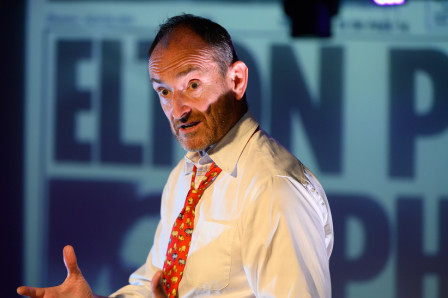Review: PHAEDRA at National Theatre, Lyttelton
Scholars would accept that the Greeks knew a thing or two about mankind’s foibles, failings and fallibilities. Undoubtedly determined to ensure that the theatrical fashion for exploring human vice and perversion would never die-out, their dramatists oft returned to (and rehashed) yarns of gore, exploring incest, infanticide, lust, regicide and an assortment of other unpalatable proclivities, to excess.
 Cast of Phaedra at the National Theatre. Photo by Johan Persson
Cast of Phaedra at the National Theatre. Photo by Johan Persson
Adventurous creatives nowadays live with the ever present danger of causing moral outrage, so Director/Playwright Simon Stone has studiously deployed a broad attribution in acknowledging the sources for his new PHAEDRA which has just opened at National Theatre Lyttelton. He cites Seneca, Euripides and Racine, who among others developed versions of the story of a Queen who has lascivious designs on the loins of her stepson, but when rebuffed, lies to her husband Theseus to cover-up her inappropriate attempts at seduction. The King’s resultant wrath ensures his son Hippolytus’ demise, (usually as a result of an accident involving a horse which is spooked by a bull sent by Poseidon at his vengeful father’s behest). But who needs all that Greco-mumbo jumbo and hand-wringing nowadays! Certainly not Mr Stone, it would seem.
His updating is an altogether more sophisticated effort which reworks key characters and transposes our base subjects (some baser than others) to the entirely urban realm of London. Here, Helen (Janet McTeer, our modern Phaedra) is a successful member of the shadow cabinet — with a diplomat husband (Paul Chahidi as Hugo) and a pair of pretentiously smart children (Mackenzie Davis as Isolde and Archie Barnes as Declan) — but we also learn she was once a blond bohemian who embraced a 70s lifestyle in Marrakesh with her Moroccan lover who died tragically in a car crash. Years later and her lover’s son Sofiane (Assaad Bouab) — who fantasised over his father’s blond Viking goddess as a youth, is living in Birmingham and has decided to make contact, with devastating results.
Stone’s rapid-fire familial dialogue in the early part of the play, elevates the potentially morose and macabre tale into stratospheric territory. Rapier exchanges between the unapologetically forthright members of this intelligentsia family, provide the sort of cut-and-thrust from which no-one escapes unscathed and yet their polished veneers rarely reveal emotional weakness as they parry smart-arsed rebukes and expletives over breakfast. Some of the overlapped dialogue gets lost in the cacophony, but few spectators would deny the realism of such a morning spectacle.
Neatly played-out on Chloe Lamford’s chic revolve set, the contradictions come thick and fast as a leftie-leaning, socially-liberal, educated, white family display the kind of privilege which encourages appreciation of all-things-ethnic without ever truly delving deeply into the inequalities and cultural resentments harboured by such peoples towards the wealthy citizens of former colonial powers who can afford to dabble in matters exotic as mere distraction.
Helen can no longer ignore how much Soufiane looks like his late father, and begins an affair which she uses to reawaken her lost self, with no concern for the consequences. Here, Stone deploys Omolara (Akiya Henry) as a bluntly honest, black, fellow MP to offer a voice of reason and some of the best exchanges of the piece are realised through her instantly recognisable spotlighting of imbalance in attitudes and behaviour. When later, Soufiane also begins a relationship with Isolde whose marriage to Eric (John MacMillan) is blighted by over-niceness, desire causes irreparable ruptures and the many moments of awkward hilarity — particularly a birthday party scene at a fancy restaurant — begin to give way to tragedy.
The cast are universally marvellous and clearly relish every juicy line they get to utter. Forget all you thought you knew about Greek tragedy and grab a ticket.
Latest News

 Beatrice Penny-Touré to join West End production of THE PHANTOM OF THE OPERA
6 February 2026 at 13:59
Beatrice Penny-Touré to join West End production of THE PHANTOM OF THE OPERA
6 February 2026 at 13:59

 Initial cast and creative team for ROSIE A NEW MUSICAL West End premiere concert
6 February 2026 at 10:02
Initial cast and creative team for ROSIE A NEW MUSICAL West End premiere concert
6 February 2026 at 10:02

 Review: MONSTERING THE ROCKETMAN at Arcola Theatre
6 February 2026 at 09:01
Review: MONSTERING THE ROCKETMAN at Arcola Theatre
6 February 2026 at 09:01

 HERE THERE ARE BLUEBERRIES at Stratford East - First look images released
5 February 2026 at 15:35
HERE THERE ARE BLUEBERRIES at Stratford East - First look images released
5 February 2026 at 15:35